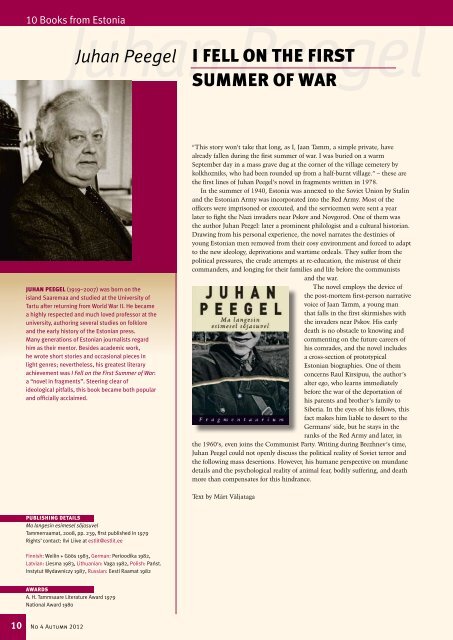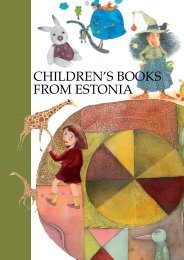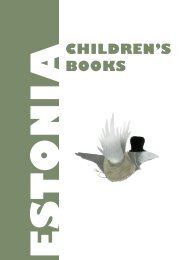No 4 Autumn 2012 - Estonian Literature
No 4 Autumn 2012 - Estonian Literature
No 4 Autumn 2012 - Estonian Literature
You also want an ePaper? Increase the reach of your titles
YUMPU automatically turns print PDFs into web optimized ePapers that Google loves.
10<br />
<strong>No</strong> 4 <strong>Autumn</strong> <strong>2012</strong><br />
Juhan Peegel<br />
Juhan Peegel<br />
i fell on The firsT<br />
10 Books from Estonia<br />
Juhan Peegel (1919–2007) was born on the<br />
island Saaremaa and studied at the University of<br />
Tartu after returning from World War II. He became<br />
a highly respected and much loved professor at the<br />
university, authoring several studies on folklore<br />
and the early history of the <strong>Estonian</strong> press.<br />
Many generations of <strong>Estonian</strong> journalists regard<br />
him as their mentor. Besides academic work,<br />
he wrote short stories and occasional pieces in<br />
light genres; nevertheless, his greatest literary<br />
achievement was I Fell on the First Summer of War:<br />
a “novel in fragments”. Steering clear of<br />
ideological pitfalls, this book became both popular<br />
and officially acclaimed.<br />
Publishing deTails<br />
Ma langesin esimesel sõjasuvel<br />
Tammerraamat, 2008, pp. 239, first published in 1979<br />
Rights’ contact: Ilvi Liive at estlit@estlit.ee<br />
Finnish: Weilin + Göös 1983, German: Perioodika 1982,<br />
Latvian: Liesma 1983, Lithuanian: Vaga 1982, Polish: Państ.<br />
Instytut Wydawniczy 1987, Russian: Eesti Raamat 1982<br />
awards<br />
A. H. Tammsaare <strong>Literature</strong> Award 1979<br />
National Award 1980<br />
summer of war<br />
“This story won’t take that long, as I, Jaan Tamm, a simple private, have<br />
already fallen during the first summer of war. I was buried on a warm<br />
September day in a mass grave dug at the corner of the village cemetery by<br />
kolkhozniks, who had been rounded up from a half-burnt village.” – these are<br />
the first lines of Juhan Peegel’s novel in fragments written in 1978.<br />
In the summer of 1940, Estonia was annexed to the Soviet Union by Stalin<br />
and the <strong>Estonian</strong> Army was incorporated into the Red Army. Most of the<br />
officers were imprisoned or executed, and the servicemen were sent a year<br />
later to fight the Nazi invaders near Pskov and <strong>No</strong>vgorod. One of them was<br />
the author Juhan Peegel: later a prominent philologist and a cultural historian.<br />
Drawing from his personal experience, the novel narrates the destinies of<br />
young <strong>Estonian</strong> men removed from their cosy environment and forced to adapt<br />
to the new ideology, deprivations and wartime ordeals. They suffer from the<br />
political pressures, the crude attempts at re-education, the mistrust of their<br />
commanders, and longing for their families and life before the communists<br />
and the war.<br />
The novel employs the device of<br />
the post-mortem first-person narrative<br />
voice of Jaan Tamm, a young man<br />
that falls in the first skirmishes with<br />
the invaders near Pskov. His early<br />
death is no obstacle to knowing and<br />
commenting on the future careers of<br />
his comrades, and the novel includes<br />
a cross-section of prototypical<br />
<strong>Estonian</strong> biographies. One of them<br />
concerns Raul Kirsipuu, the author’s<br />
alter ego, who learns immediately<br />
before the war of the deportation of<br />
his parents and brother’s family to<br />
Siberia. In the eyes of his fellows, this<br />
fact makes him liable to desert to the<br />
Germans’ side, but he stays in the<br />
ranks of the Red Army and later, in<br />
the 1960’s, even joins the Communist Party. Writing during Brezhnev’s time,<br />
Juhan Peegel could not openly discuss the political reality of Soviet terror and<br />
the following mass desertions. However, his humane perspective on mundane<br />
details and the psychological reality of animal fear, bodily suffering, and death<br />
more than compensates for this hindrance.<br />
Text by Märt Väljataga







